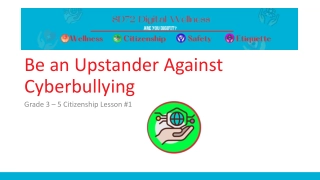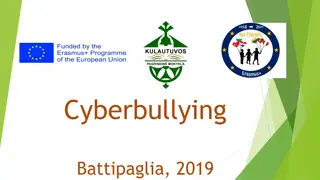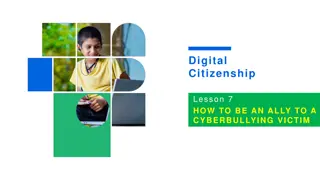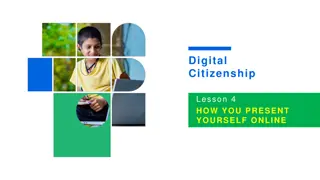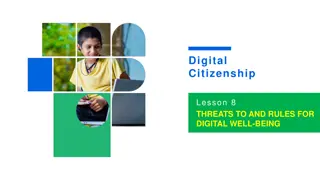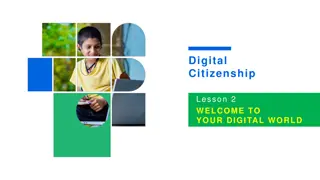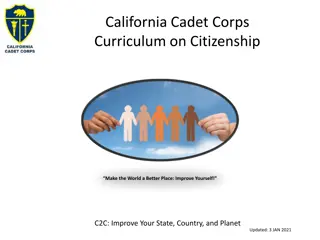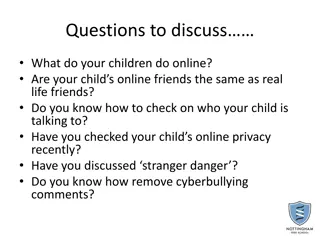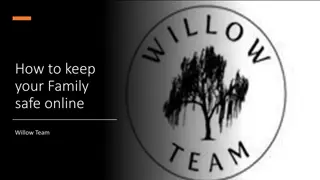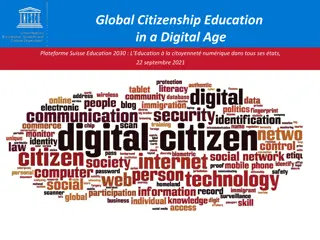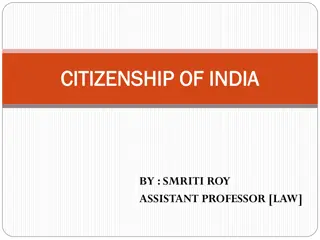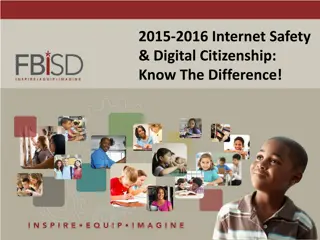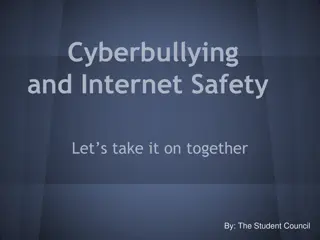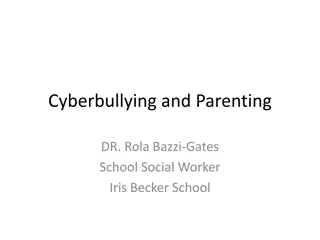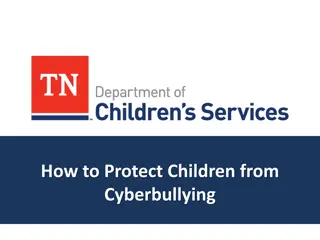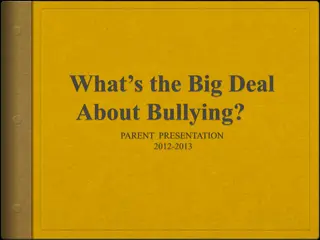Understanding Online Disinhibition and Cyberbullying in Digital Citizenship Education
Explore the concepts of online disinhibition and cyberbullying in digital citizenship education for Year 12 students (ages 16-17). Understand how online disinhibition can lead to cyberbullying, learn key vocabulary, and watch thought-provoking discussions on real-life cyberbullying incidents. Gain insights into the impact of internet behavior on individual interactions and learn strategies to counter cyberbullying in online environments.
Download Presentation

Please find below an Image/Link to download the presentation.
The content on the website is provided AS IS for your information and personal use only. It may not be sold, licensed, or shared on other websites without obtaining consent from the author. Download presentation by click this link. If you encounter any issues during the download, it is possible that the publisher has removed the file from their server.
E N D
Presentation Transcript
DIGITAL CITIZENSHIP YEAR 12 (AGE 16-17) Online Disinhibition and Cyberbullying commonsense.org/education/uk/digital-citizenship/resources Shareable with attribution for noncommercial use. Remixing is permitted.
Essential Question How does online disinhibition sometimes How does online disinhibition sometimes lead to cyberbullying? lead to cyberbullying? commonsense.org/education/uk/digital-citizenship/resources Shareable with attribution for noncommercial use. Remixing is permitted.
Learning Objectives ll Define "online disinhibition" and describe how it can be both positive and negative. 2 2 Explain how anonymity, lag time and lack of nonverbal cues all contribute to online disinhibition. Analyse how online disinhibition can cause cyberbullying and brainstorm ways to counter it. 3 3 commonsense.org/education/uk/digital-citizenship/resources Shareable with attribution for noncommercial use. Remixing is permitted.
KEY VOCABULARY Cyberbullying Using digital devices, sites and apps to intimidate, harm and upset someone commonsense.org/education/uk/digital-citizenship/resources Shareable with attribution for noncommercial use. Remixing is permitted.
WATCH + DISCUSS 'Stranger Things' star leaves Twitter after cyberbullying Millie Bobby Brown, 14, deactivated her Twitter account after being besieged by posts using the hashtag #takedownmilliebobbybrown. WATCH FULL EPISODES: http://abc.go.com/shows/good-morning-america Visit Good Morning America s Homepage: https://www.goodmorningamerica.com/ Discuss: What is your reaction to this story? Why might people target someone online like this? commonsense.org/education/uk/digital-citizenship/resources Shareable with attribution for noncommercial use. Remixing is permitted.
WATCH + DISCUSS Is the Internet Making You Meaner? If the Internet's making you feel meaner, you're not imagining it. People really do act differently online than they do in person. Here s why. Co-produced with Common Sense Education @CommonSenseEd TEACHERS: Get your students in the discussion on KQED Learn, a safe place for middle and high school students to investigate controversial topics and share their voices. ABOVE THE NOISE is a show that cuts through the hype and investigates the research behind controversial and trending topics in the news. Hosted by Myles Bess. *NEW VIDEOS EVERY OTHER WEDNESDAY* SUBSCRIBE by clicking the RED BUTTON above. Follow us on Instagram @kqedabovethenoise ***Do people act differently online than they do in person? Yes. This phenomenon is known as the online disinhibition effect. Essentially, being online lowers your inhibitions. This often results in people either behaving meaner, or opening up more online than they normally would in face to face conversations. When people act meaner online it can lead to hostile online environments. This is what researchers call toxic disinhibition. Conversely, when people open up more freely online than in person-- they can often feel more connected to online users, which creates a supportive online environment. Researchers call this benign disinhibition. *Why are people meaner online than they are in person? People aren t always meaner online than in person, but according to the online disinhibition effect people can act differently online. The most common ways people act differently is by either being meaner or opening up more. According to a paper published in 2004 by psychologist John Suler, there are about 6 main reasons people act differently online. First, if you re anonymous online you feel less accountable for your actions and less vulnerable when it comes to opening up about personal things. Additionally, online you re often invisible so you don t have to worry about body language and tone-- and you can easily misrepresent yourself. With online communication there is usually a lag-time between when you post something and when you get a response, so it s easy to just post something and bounce without thinking about the consequences. Online, we also tend to attribute voices and imagined characteristics to written text based on our own expectations and not necessarily on the actual intended meaning/ tone of the text, which can lead people to act differently than they might in person. People also tend to view online more as a game, where real life rules don t necessarily apply. And finally, authority figures aren t as big of a deal online-- online, people pretty much feel and act as equals, which can lead people to act differently than they normally would offline. SOURCES: The Online Disinhibition Effect (CyberPsychology Behavior) https://s3.amazonaws.com/academia.edu.documents/30420106/suler.pdf?response-content-disposition=inline%3B%20filename%3DThe_online_disinhibition_effect.pdfX-Amz-Algorithm=AWS4-HMAC-SHA256X-Amz-Credential=AKIAIWOWYYGZ2Y53UL3A%2F20190726%2Fus-east-1%2Fs3%2Faws4_requestX-Amz-Date=20190726T235617ZX-Amz-Expires=3600X-Amz-SignedHeaders=hostX-Amz-Signature=06fc23dc049a34e11053da8e98a6c22738a851da00ac5bb503b26c656a3dc9bc Individual and social benefits of online discussion forums (Computers in Human Behavior) https://www.sciencedirect.com/science/article/pii/S074756321500268X Online Harassment 2017 (Pew Research Center) https://www.pewinternet.org/2017/07/11/online-harassment-2017/ A Majority of Teens Have Experienced Some Form of Cyberbullying (Pew Research Center) https://www.pewinternet.org/2018/09/27/a-majority-of-teens-have-experienced-some-form-of-cyberbullying/ Anyone Can Become A Troll: Causes of Trolling Behavior in Online Discussions (CSCW 2017) https://arxiv.org/pdf/1702.01119.pdf The Psychology Behind Social Media Interactions (Psychology Today) https://www.psychologytoday.com/us/blog/behind-online-behavior/201408/the-psychology-behind-social-media-interactions Why Is Everyone on the Internet So Angry (Scientific American) https://www.scientificamerican.com/article/why-is-everyone-on-the-internet-so-angry/?redirect=1 Technology addiction's contribution to mental wellbeing: The positive effect of online social capital (Computer Human Behavior) https://www.ncbi.nlm.nih.gov/pmc/articles/PMC4283587/ FOR EDUCATORS KQED Learn https://learn.kqed.org KQED Teach https://teach.kqed.org KQED Education https://ww2.kqed.org/education https://www.facebook.com/KQEDEducation https://twitter.com/KQEDedspace https://www.instagram.com/kqededucation About KQED KQED, an NPR and PBS affiliate in San Francisco, CA, serves Northern California and beyond with a public-supported alternative to commercial TV, Radio, and web media. Funding for Above the Noise is provided in part by the Corporation for Public Broadcasting, Silver Giving Foundation, Stuart Foundation, and William and Flora Hewlett Foundation. To watch this video on KQED Learn and to continue the discussion, click here. commonsense.org/education/uk/digital-citizenship/resources Shareable with attribution for noncommercial use. Remixing is permitted.
KEY VOCABULARY Online disinhibition effect When people behave differently online than they would in real life commonsense.org/education/uk/digital-citizenship/resources Shareable with attribution for noncommercial use. Remixing is permitted.
REFLECT: COUNTERING CYBERBULLYING Part 2 Directions Although online disinhibition can sometimes lead to positive outcomes, it can often cause people to make hostile or mean comments. These comments can cause toxic drama and can even lead to cyberbullying. To counter this effect, we can pause before we post and think about how online disinhibition -- anonymity, lag time and lack of nonverbal cues -- might be impacting our ideas and words. Complete the table to analyse how online disinhibition might be countered. commonsense.org/education/uk/digital-citizenship/resources Shareable with attribution for noncommercial use. Remixing is permitted.
commonsense.org/education/uk/digital-citizenship/resources Shareable with attribution for noncommercial use. Remixing is permitted.


